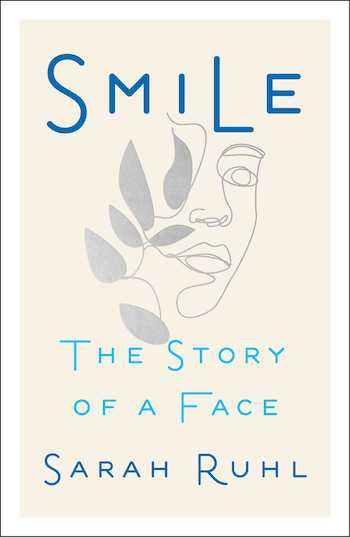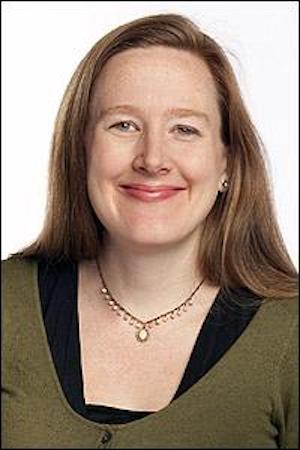Book Review: Sarah Ruhl’s “Smile: The Story of a Face”
By Helen Epstein
This is the voice of a wife, mother, sister, daughter, friend, patient, and author who wrote a memoir on her own terms. I can’t wait for Sarah Ruhl’s next play.
Smile: The Story of a Face by Sarah Ruhl, Simon & Schuster, 256 pages, $27
 If you love Sarah Ruhl’s plays as I do (The Clean House and Dead Man’s Cellphone), you will be happy to spend time listening to the playwright speaking in her own voice. “I’ve always preferred Montaigne’s discursive reflections to Augustine’s self-revelations,” she writes in her memoir Smile, placing herself in an intellectual rather than confessional autobiographical tradition. She chooses to tell her story — of a contemporary writer, wife, and mother faced with chronic illness — in a style that digresses from, rather than focuses on, one sustained narrative.
If you love Sarah Ruhl’s plays as I do (The Clean House and Dead Man’s Cellphone), you will be happy to spend time listening to the playwright speaking in her own voice. “I’ve always preferred Montaigne’s discursive reflections to Augustine’s self-revelations,” she writes in her memoir Smile, placing herself in an intellectual rather than confessional autobiographical tradition. She chooses to tell her story — of a contemporary writer, wife, and mother faced with chronic illness — in a style that digresses from, rather than focuses on, one sustained narrative.
Smile takes its title from a consequence of Bell’s Palsy, an illness she contracted in 2010, the day after she delivered barely 36-week-old twins after a high-risk pregnancy. Ruhl, who has a devoted psychiatrist husband named Tony and Anna, a three-year-old daughter, is in her hospital bed, breastfeeding one of the tiny twins, when her lactation consultant says unexpectedly, “your eye looks droopy.”
“Yes, my eyes are a little droopy,” the playwright replies without missing a beat, “I’m Irish.”
“That’s not what I mean,” says the lactation consultant.
When Ruhl gets up and looks into a mirror, she sees, “The left half of my face had fallen down. Eyebrow, fallen; eyelid, fallen; lip, fallen, frozen, immovable.… I tried to move my face. Impossible. Puppet face, strings cut.”
Ruhl worries that she may have had a stroke, but the neurologist’s diagnosis is Bell’s Palsy. She is told that sometimes the condition resolves within months (it did for her mother in three weeks); sometimes it doesn’t. Over 10 years of many kinds of medical treatments, Ruhl learns that she is in the five percent of the population whose partial facial paralysis is permanent.
“The Greeks, the Romans and the Persians all noticed a condition,” she explains in one of the very short chapters that make up Smile, “in which the forehead could not wrinkle, the face was paralyzed on one side, and facial spasms occurred.” For reasons unspecified by the author, the condition was named after Sir Charles Bell, a 19th-century surgeon. Two hundred years later, the cause of Bell’s Palsy is still not well understood and there remains no definitive treatment. Some patients, like Angelina Jolie, recover quickly and completely; others partially; some remain partially paralyzed for the rest of their lives.
While her newborn twins remain in the ICU, Ruhl goes home to her husband and toddler daughter, “disfigured,” as she perceives it, and unable to smile at the people she most loves. Later, she makes a list of smiling idioms:
A ready smile
Wreathed in smiles
Smiling from head to toe
A forced smile; a smile freely given
A million-dollar smile (like Julia Roberts’ smile, which is insured for millions of dollars)
Smiling with your whole body
Smiling with your eyes
Smile and the whole world smiles with you
Every American girl is taught to smile — with teeth, as Ruhl points out — from the time she is born. In her line of work, the theater, every person knows the value of a smile and the drawbacks of an inexpressive face. Ruhl comes to see her condition as “asymmetry,” or “disfigurement” or “broken face.” Her smile looks like a grimace — which affects everything from smiling at her newborns to posing for photographers at a photo shoot for the Tony Awards. She cannot shut her left eye, which has many unforeseen reverberations, from making love to swimming in the ocean. She cannot entirely close the left side of her mouth, which makes it difficult to enunciate consonants. When asked what her twin daughter Hope’s name is, she can answer only, “Ho.”
A frozen face, Ruhl immediately learns, requires its owner to be prescient, to be constantly aware of how she is coming across in face-to-face conversation and to compensate for it.
In a mini-scene in the hospital shortly after the twins’ birth, Ruhl describes her fury at a brusque, unhelpful nurse who refers to her twins as Baby A and Baby B. “I wasn’t yet used to my frozen face,” Ruhl writes, “and realized I didn’t know how to be ingratiating with strangers without smiling. How does one do that, especially if one is from the Midwest, where a smile is almost a prerequisite for citizenhood?”

Playwright Sarah Ruhl.
As in many of her plays, Ruhl muses about so many disparate things that Smile reads less like a medical memoir and more like a series of far-flung jazz riffs on a theme to which she returns every few chapters. She doesn’t pull all the autobiographical elements together in one place, but scatters them throughout the book. She was born a Catholic in Wilmette, IL, in 1974 to a mother who loved and worked in theater and a businessman father who died while she was in college. She married a child psychiatrist she met at Brown, with whom she lives in Brooklyn. Now a Buddhist, she writes equally wryly about her trouble taking communion and her introduction to Buddhism by her children’s Tibetan nanny Yangzom.
Ruhl first seriously became interested in theater at the Piven Theater Workshop in Evanston. She then studied playwriting with Paula Vogel at Brown University. But Ruhl’s scripts, Vogel, and Ruhl’s many other theater friends make only cameo appearances in Smile. What stays in your mind, apart from the irrevocable condition that strikes her out of the blue, are her many interactions with the medical profession: the good, bad, and indifferent specialists in neurology, psychiatry, physical therapy, sleep, acupuncture, chiropractic, Reiki, and Alexander Technique she consults with. We learn why the best ones were helpful. Early on, after an 0b/gyn dismisses her complaint of itchiness while pregnant, Ruhl self-diagnoses online — like so many of us do these days — and confronts her doctor with a diagnosis of cholestasis of the liver, in which bile leaks into the bloodstream causing terrible itching.
“More important,” Ruhl writes, “it can immediately kill your babies.”
Her physician assures her that she does not have cholestasis of the liver. It is a rare disease affecting one in a thousand women.
“But I have all the symptoms,” I said.
“How do you know,” he asked.
“Itchymoms.com,” I said…. “A week later my test came back positive.”
It is another more attentive neurologist who takes an old-fashioned and thorough medical history from Ruhl and discovers she has celiac disease. “I was sick a lot in my childhood,” she remembers. “I probably missed a month or two of school every year because of illness…. I was always dimly aware that other people seemed to have vast stores of physical energy whereas I had very little…. Now I knew I was getting very little sustenance from my food; it was essentially passing through me, and my body was in a constant state of hyper vigilance or inflammation.” In addition to adopting the diet-fad of many of her gluten-averse theater friends, Ruhl learns that celiac disease might also be interfering with her healing from Bell’s Palsy.
If you are looking for a medical memoir about learning to live with Bell’s Palsy, you will be frustrated with this book and find it rambling and all over the place. If, however, you love Ruhl’s voice and sensibility, you will enjoy spending time with her, no matter where she decides to take you. My favorite riff — possibly because I rarely read about episodes like these — are her descriptions of being a playwright-with-children. I will quote her at length because what she describes is germane to so many working mothers, whether or not they have chronic illness.
“Because I couldn’t see how to travel with the babies to theater openings and care for them with my mind free to do my rewrites, I stopped doing any theater openings out of town. On the one occasion I’d already committed to an out-of-town production, I told the director I’d come for the first week of rewrites, and the last week of previews, rather than the whole month of rehearsals. And I left the kids home with Tony and Yangzom….
“When I got to rehearsals, I worked steadily on rewrites. I’d written the play before the babies were born, and now came the magical time for realizing language in three dimensions. I welcomed the joy of collaborating with actors again, making up an alternative world in a room together.
“Halfway through that first week, Tony called me: William was in the hospital…. As a doctor [Tony] felt capable of handling this on his own, but he felt I should know…. I flew home to be with William.”
Ruhl’s son recovered but, she says,
“During the week I was gone, the twins had given up on breast-feeding. When I tried nursing them, they just looked at me in the eye as though to say ‘huh?…. I flew back to rehearsals for the last week of previews and opening night. Previews are that magical, anxiety-ridden time when you realize whether or not your play is working in front of an audience…. I was incredibly relieved that the audience laughed in the right places.
“After the show … the artistic director approached. I thought he might congratulate us — the audience seemed ebullient — instead, he chastised me for being away so much during the rehearsal process. While others drank cocktails and celebrated, the artistic director told me that I was the laziest, most irresponsible writer in the American theater.”
The next morning, he apologized.
“I like apologies. It’s not given in every lifetime to forgive or be forgiven.” She goes on to say, “Could my play have been better had I been more present in the room, less torn between motherhood and writing? It’s possible. Was it also possible that I ignored some notes I was given, not because I was out of the room but because I didn’t agree with them aesthetically? Also possible. If I forgave the artistic director, why cling to his words or write them down at all? I suppose I hold fast to his words in case any leader of a theater or any leader of another enterprise that employs women might wonder what it’s like to be a breast-feeding mother of twins trying to work out of town.”
This is the voice of a wife, mother, sister, daughter, friend, patient, and author who wrote a memoir on her own terms. I can’t wait for Ruhl’s next play.
Helen Epstein is the author of Joe Papp: An American Life, The Long Half-Lives of Love and Trauma and eight other books of nonfiction. She has been reviewing for the Arts Fuse since its inception.
Tagged: Bell’s Palsy, Culture Vulture, Helen Epstein, memoir, Sarah-Ruhl

